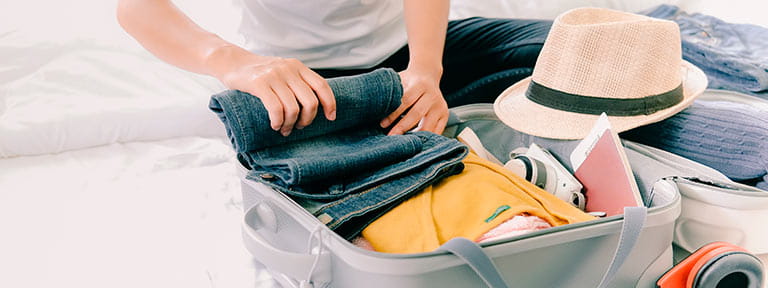Travel advice
Nine useful items to take on holiday
14th December, 2018
Unless you’re being dropped in the middle of the Amazon on a survival mission, it’s unlikely that you will need a GPS device and a paracord, however there are some essential items that will certainly help you to survive from a comfort perspective.
We asked our customers what items they couldn’t live without on holiday. Here are the top choices:
1. Travel plug / adapter
Obvious, but essential. Whether you need to charge a phone, use an electric razor or plug in your own hairdryer, you will need to adapt your device to work with the local power supply. Many countries differ in terms of their plug types, so make sure you research and buy the right one. Our destination pages list the correct plug type for that particular destination.
2. Portable charger
Again, an obvious one, but incredibly useful if you’re out on long excursions and are using your device a lot for photography, videography and communication. You can charge the portable charger overnight at the hotel and then take it with you, to give your device an extra power boost should it be running low on juice that day.
3. A scarf
A seriously underrated item. Aside being used as its intended purpose - a scarf, this versatile garment can be used as a sarong, a head dress, a mask, a towel and a means to cover up at religious sites. It can also be used as a blanket on the aircraft, if the air-conditioning is too cold.
4. Moisturiser
Traveling from climate to climate, on an aircraft or through dry, arid areas can really take its toll on your skin. Moisturising is really important if you want to look fresh and avoid getting dry, flaky skin. If you have a favourite brand that is more than the 100ml, make sure it goes in the aircraft hold, so not to have to kiss it goodbye at airport security.
5. Reusable carrier bags
These are incredibly practical when travelling. Most customers we talked to, found these useful for stashing wet swimwear in when touring from place to place. They are also pretty handy for concealing dirty laundry – no one needs ‘that embarrassment’ at airport security if your bag gets searched. If you want to be really environmentally friendly, go for hessian bags.
6. Spare batteries
Batteries may not always be cheap in your holiday destination and they can be a mare to find if you are on the move a lot, for example on a safari tour. To avoid missing that golden photographic opportunity, take spares for your camera and all your other devices and keep them packaged, to avoid any leakages on your personal items.
7. Anti-bacterial gel / wipes
This one goes without saying really. Prevent the contraction and spread of nasty bacteria on your travels by anti-backing your hands after touching anything in public places and after you visit the bathroom. Getting ill is unpleasant at the best of times, but on holiday it can be horrendous. Using anti-bacterial wipes or hand gel also means you’ll also be helping to stop any bacterial infections from coming home with you.
8. A padlock
Unfortunately, nowhere in the world is safe from thieves. Opportunists strike when you least expect it, so take a padlock for your luggage and affix it whenever you are on the move from destination to destination. Making a potential theft more challenging may make all the difference when it comes to you escaping the hassle of losing your valuables.
9. Water bottle
A reusable water bottle helps to reduce single use plastics – a cause that Saga is heavily invested in. If you can, buy an aluminium one to take on excursions. Read our guide to sustainable tourism.
Do you have a special item that you can’t live without on holiday? Let us know and we will include it if it’s a popular item.
The opinions expressed are those of the author and are not held by Saga unless specifically stated.
The material is for general information only and does not constitute investment, tax, legal, medical or other form of advice. You should not rely on this information to make (or refrain from making) any decisions. Always obtain independent, professional advice for your own particular situation.



